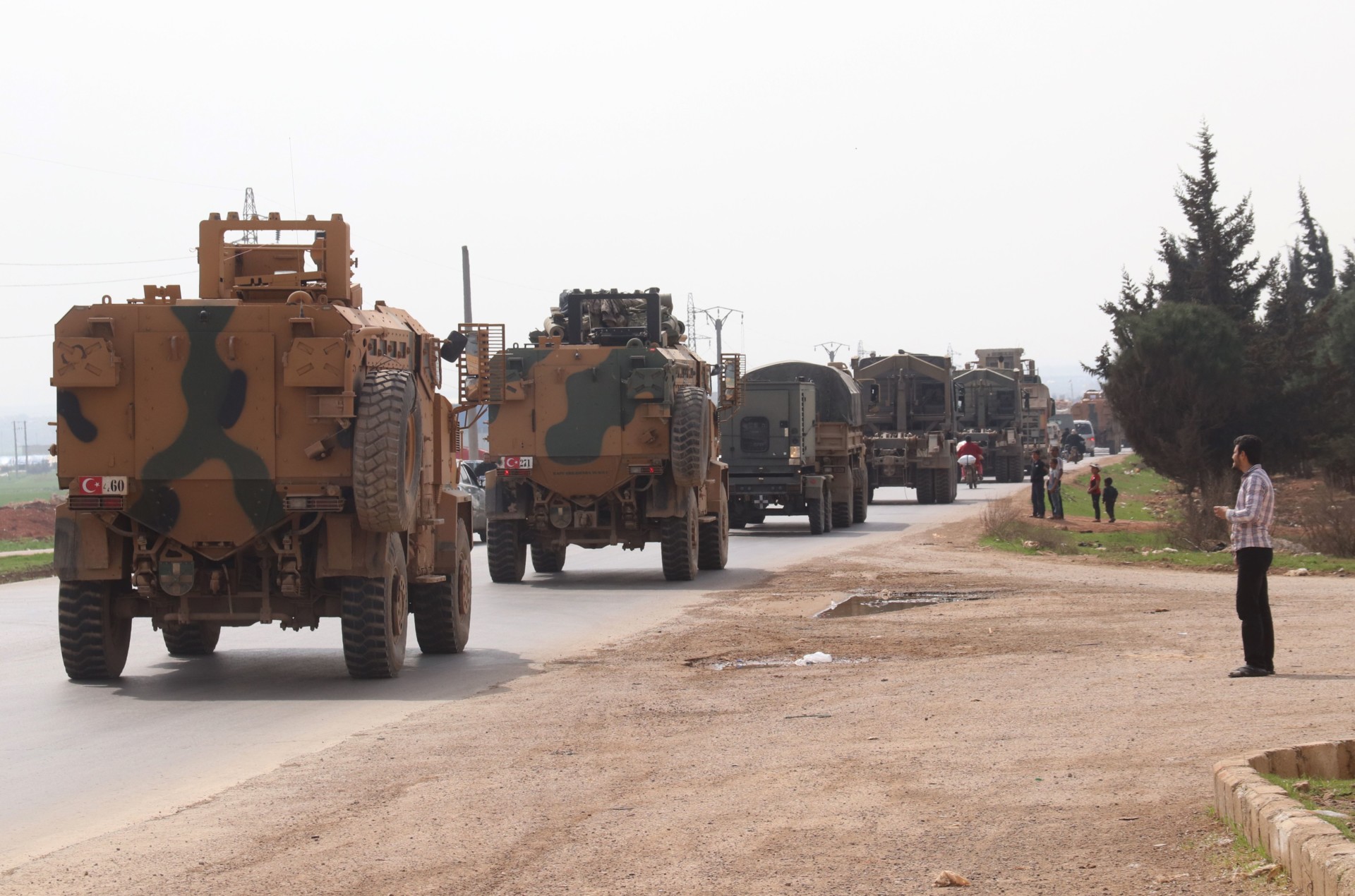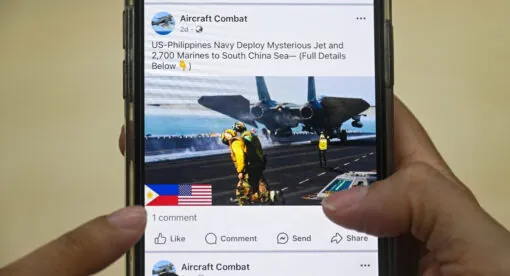After weeks of intense conflict in Syria’s northwestern province of Idlib, a cease-fire is finally in place. Though violations continue, it appears that the two guarantors – Turkey and Russia – remain determined to see it stick, at least for now. This presents the international community with a rare opportunity to insert itself in a meaningful way, to bolster Turkey’s position diplomatically, and help sustain a semblance of stability in Idlib. If the status quo remains the same, a resumption of hostilities is inevitable, and as with all things Syria, the costs will not be limited to the immediate neighborhood.
Turkey’s Perspective
Given its proximity to Idlib, Turkey considers the issue highly significant. But for Turkish President Recep Tayyip Erdogan and his AK Party, the fate of Idlib is of existential value. Between Dec. 1, 2019, and early March 2020, roughly 1 million civilians were displaced by hostilities, forced to flee toward the Turkish border, where almost that same number were already residing in overpopulated camps. During 10 months of fighting that began in April 2019, the scale of opposition-controlled territory shrank by 35%. Despite accelerated and enhanced weapons supplies from Turkey, opposition defenses and manpower were collapsing. Under the terms of an 18-month-old agreement between Turkey and Russia, the Turkish military had established multiple posts across Idlib to “guarantee” stability there, but one by one they were swallowed up within regime advances.
The prospect of the Syrian regime conquering Idlib risks catalyzing a series of developments that could kill Erdogan’s hopes of re-election when Turkey next goes to the polls. The most significant threat comes from the possibility of large numbers of Syrians crossing into Turkey, adding to the already 3.7 million present on Turkish soil. Turkish domestic politics has turned entirely hostile to the economic strain resulting from large refugee communities, so a substantial swelling of those numbers would cripple Erdogan’s standing. In 2019, Turkey was widely accused of forcibly deporting undocumented Syrian refugees, and months later its military launched a major incursion into Syria’s northeast in order to weaken the Kurdish-led Syrian Democratic Forces and to expand Turkish control over northern regions of Syria, where Syrian refugees inside Turkey might one day relocate.
That raises the second threat posed by a regime victory in Idlib: a catastrophic blow to Turkish military credibility that could lead to a rollback of Turkey’s control over large swathes of northern Syria or make that control unsustainable. The fact that Turkey launched three military interventions in northern Syria between August 2016 and October 2019 (Operations Euphrates Shield, Olive Branch and Peace Spring) was largely due to the perceived threat posed by the Kurdish Democratic Union Party and its leadership of the American-backed Syrian Democratic Forces. Were Turkey forced to withdraw from the border regions of northern Syria, the Democratic Union Party would benefit, whether directly or indirectly, and from Turkey’s perspective, three and a half years of military effort to neutralize the threat would go up in flames.
In sharing Syria’s northern border and having played a central role in shaping dynamics within Idlib, Turkey is also acutely aware that the crisis there is far from a local one. The unprecedented scale of the humanitarian crisis reflects just one aspect of how developments in Idlib could have profound international ramifications. Syria was never a local or regional problem, and as a microcosm of the wider conflict, neither is Idlib. Unfortunately, the rest of the world refused to acknowledge this.
A Powerful Turkish Intervention
Given the stakes involved for Turkey and specifically for Erdogan, and given the international community’s indifference, the Turkish military launched its fourth intervention in under four years. On March 1, Operation Spring Shield began. Turkey ramped up and publicized an intensive drone campaign targeting Syrian air bases and military facilities, tanks, heavy weaponry, and convoys of reinforcements hurriedly dispatched by Damascus to key front lines. Short- and long-range Turkish artillery systems inside Idlib added to the bombardment while providing fire support for opposition maneuvers. Sophisticated Turkish electronic warfare systems, like KORAL, were activated in a seemingly successful attempt to jam and confuse top-of-the-line Russian-made air defense systems, like the Pantsir-S1 and Buk, several of which were picked off in precision strikes.
In the space of a week, Turkey’s air campaign appears to have destroyed the following (I’m told that the U.S. government considers this information “more or less” accurate):
- 3 fighter jets
- 3 aerial drones
- 8 helicopters
- 135 tanks
- 86 artillery and multiple rocket launch (MRL) systems
- 77 armored vehicles
- 9 arms depots
- 5 air defense systems
- 16 anti-tank guided missile and mortar positions
For the first time in Syria’s nine years of conflict, a foreign state actor intervened militarily and dealt a serious blow to the Assad regime’s military capabilities. Perhaps more significant than weapons losses were the hundreds of pro-regime personnel killed in Turkey’s strikes – an average of 60 per day from Feb. 28 to March 5. Since hostilities resumed on Dec. 1, 2019, an estimated 1,500 pro-regime fighters died and several times that number were wounded. For a regime already critically short of manpower, those losses were grave. Tellingly, the regime began deploying policemen and visibly underaged conscripts to the front lines, to replace those lost in Turkish strikes. In an equally significant response, Iran made a move it had staunchly refused to do until early March: it began dispatching large numbers of its militia proxies – particularly Hezbollah and the Afghan Liwa al-Fatemiyoun – to Idlib front lines.
The Crafting of a Cease-Fire
It was no surprise therefore, that Russian President Vladimir Putin reversed his previous rebuffing of Erdogan and agreed to meet in Moscow on March 5. The “Moscow Summit” announced a cease-fire and the formation of a “secure corridor” measuring 6 kilometers north and south of the M4 highway, which runs west to east across the center of Idlib. Russian and Turkish forces would, the summit announced, soon begin “joint patrols” along the M4, through the corridor. Given the intensity of hostilities and losses over the preceding week and the geopolitical importance to both Turkey and Russia of their bilateral relationship, the cease-fire was predictable. But the “secure corridor” was a surprise. The entire M4 remains in the hands of Turkish-backed opposition factions and irreconcilable jihadists, and the pro-regime front line remains at least 25 kilometers south of the M4 itself.
To many at the time, Turkey’s agreement to establish the corridor was baffling, as it appeared to indicate a willingness to see the opposition – and thus Turkey – eventually cede a substantial swathe of strategically valuable territory all the way to the M4. Given the scale of Turkish intervention in the preceding week, and the dramatic impact it had on battlefield dynamics, one would have assumed Ankara would have played a stronger hand at the table.
Nevertheless, the design, implementation, timetable, and conditions of operation within the corridor all remained a mystery, as the agreement to establish one was the only detail actually agreed to in Moscow. It is possible that the corridor will remain a theoretical exercise in Turkish-Russian de-escalation and one that will gradually be eroded away by a dissolving cease-fire. In fact, pro-regime forces have violated the cease-fire several dozen times since it began at midnight on March 5-6. The fact that localized violations have thus far not been allowed to spiral into major hostilities indicates that for now, at least, both Turkey and Russia are determined to see the cease-fire last, even if imperfectly.
In televised comments on March 10, Turkish Foreign Minister Mevlüt Çavuşoğlu surprised many when he suggested that all opposition-controlled territory south of the M4 would henceforth be recognized as under Russian control. That would represent an extraordinary Turkish concession, forcing its proxies to cede control over crucial regions like Jabal al-Zawiyeh, Sahl al-Ghab, Jabal al-Arbain, and potentially Jabal al-Akrad. However, an examination of Turkey’s actions in Idlib in recent weeks might provide an explanation for Turkey’s decision. A majority of Turkey’s recent military deployments have been to newly created positions situated along the M4. Even prior to the initiation of Operation Spring Shield, that clearly indicated a Turkish red line to the regime: “Go no further than the M4.”
That would open up what may, in the end, be the least bad option available for the Idlib crisis: the “Gazafication scenario,” in which territory stretching from the M4 to the Turkish border (approximately 35 kilometers at its longest) remains under Turkish-controlled opposition rule. Playing the role of Hamas in this case would be former al Qaeda affiliate Hayat Tahrir al Sham. However, to make such a situation more tenable, Turkey would likely coercively downgrade Hayat Tahrir al Sham’s dominance into some form of a power-sharing arrangement with more mainstream opposition actors. But in reality, that scenario does not look especially appetizing or, within current dynamics, particularly realistic, given the likelihood of renewed hostilities.
Turkey’s Rationale
In intervening so aggressively on March 1, Turkey appears to have been acting solely to slow or pause the regime’s advance, to force the Russians to the table, and to negotiate an arrangement that kept Turkey’s national security interests largely intact, while avoiding a collapse in relations with Moscow. In doing so, Turkey would be far from the first in treating crises in Syria with global ramifications from a purely self-interested and short-term perspective. From a point of potential strength and advantage, Turkey has signaled a willingness to cede valuable opposition territory. Given its alignment with Damascus and ideological hostility to the very concept of an opposition-held Idlib, that provides Russia with an excuse to eventually re-escalate.
This is where the international community could begin to have an effect – to avoid the truly disastrous consequences that so feasibly lie ahead. For starters, the United States and Europe could collectively make clear that there will be consequences if the current cease-fire is allowed to break down through violations by pro-regime forces; that severe sanctions will target (for the first time) Russia, should it allow the cease-fire to end; and that military options do remain on the table to help enforce the status quo. In the astutely pointed words of Ambassador Fred Hof: “in dealing with adversaries devoid of human values and basking in impunity, diplomacy unbacked by the credible threat of military force is not really diplomacy; rather, it is a useless exercise in wordsmithing.”
Charles Lister is a Senior Fellow and Director of the Extremism and Counterterrorism Program at the Middle East Institute (MEI). Lister’s work focuses primarily on the conflict in Syria, including as a member of the MEI-convened Syria Study Group; and on issues of terrorism and insurgency across the Levant. He is the author of the critically acclaimed book, “The Syrian Jihad: Al-Qaeda, the Islamic State and the Evolution of an Insurgency” (Oxford University Press, 2016).
The views expressed in this article are those of the author and not an official policy or position of the Newlines Institute.






